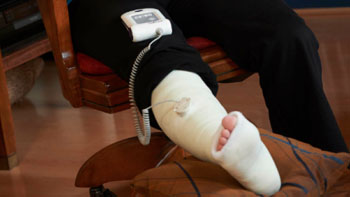Study Suggests Fractures Not Improved by Post-Surgery Ultrasound Treatment
By MedImaging International staff writers
Posted on 04 Nov 2016
The results of a new clinical trial indicate that treatment using Low-Intensity Pulsed Ultrasound (LIPUS), following surgery to repair a bone fracture may not improve the chances of recovery, despite popular belief that it does.Posted on 04 Nov 2016
The US Food and Drug Administration (FDA) approved the use of LIPUS for the healing of fractures in 1994. LIPUS is often used for tibia fractures that heal slowly and that often require follow-up surgery.

Image: A new study casts doubt on the assumption that LIPUS treatment can improve the chances of recovery after surgery for a shinbone fracture (Photo courtesy of Bioventus Global/Handout).
The results of the randomized controlled trial that included 501 patients from academic trauma centers in North America were published in the October 25, 2016, issue of the British Medical Journal (BMJ). The patients had undergone surgical repair for a lower leg (tibia) fracture between the years 2008 and 2012.
The researchers from the McMaster University (Hamilton, ON, Canada) concluded that there was no difference in the recovery time between those patients that received LIPUS treatment and those that received a placebo treatment. There was also no difference in the time it took for functional recovery including quality of life, leisure activities, return to work, or the time to full weight-bearing activities between the two patient groups.
Xavier Griffin, associate professor, trauma surgery, the University of Oxford, said, "These authors report important patient-centered outcomes...showing that low intensity pulsed ultrasound is of no benefit to adults with tibia fractures. It is time for us to make good use of their determination and abandon this ineffective treatment."
Related Links:
McMaster University














